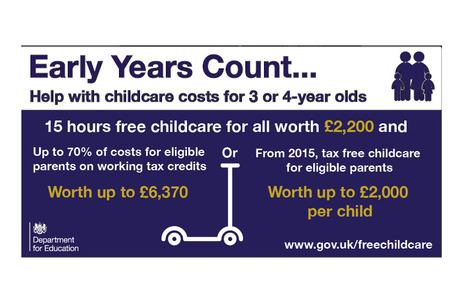
The Department for Education will use Facebook and Twitter, and work with Family Information Services, to show families how much the Government is saving them in childcare costs through the early education places for disadvantaged twos and three- and four-year-olds, and Working Tax Credits (or from next year the Tax-Free Childcare scheme).

The childcare and education minister Sam Gyimah made the announcement at the Family and Childcare Trust’s annual conference yesterday. It follows a meeting Mr Gyimah had with a group of parent bloggers last week to discuss policy and opinions on childcare and early years.
During the conference, the minister also told providers that they need to be creative and innovative with the funding they have. He went on to revisit the use of the 1:13 ratio for three- and four-year-olds when a graduate is present, which he said could make a huge difference to early years settings' costs.
His comment was in response to a question by Karen Frost, head of prevention and early intervention at Bracknell Forest Council, who argued that the council doesn’t receive enough money from the Government to give to settings to deliver the free places, and that they can’t ‘balance the books’.
However, Carole Edmond, managing director of Bright Horizons, who took part in a panel session on childcare funding, access and affordability, claimed that operating on a 1:13 adult:child ratio would actually cost more.
She said that there might be occasions when settings can use the 1:13 ratio, but not all the time if they want children to have a ‘great experience’.
Ms Edmond argued that a 1:8 ratio is needed when a child wants a cuddle or quiet time or if a nursery has three-year-olds with development delay or special needs.
Also discussed during the conference was the support available to parents and how it needs to be simplified.
Carole Edmond suggested that Family Information Services create an online tool, similar to comparison sites, where parents can see the different options of support available to them, and the costs.
There were also criticisms of the Universal Credit, which many of the speakers said could lead to provider debt, as well as the Government’s Tax-Free Childcare scheme, being introduced in autumn 2015.
Steve McCabe, shadow minister for children and families, warned that with the Tax-Free Childcare scheme parents who put in inaccurate claims could face penalties of £3,000 from HMRC.
Another issue he said is that National Savings & Investment (NS&I), the sole operator delivering the scheme, outsources a lot of operations to French firm Atos, which came under fire over the Work Capability assessments under the Welfare to Work policy.
Atos was tasked by the Department of Work and Pensions (DWP) with assessing the ability of disability benefits claimants to work under the Employment and Support Allowance scheme.
Mr McCabe also warned that the Tax-Free Childcare scheme could increase costs for parents as it concentrates on demand rather than supply.
He said that the Government should take heed from Australia, which moved to demand-led funding in the late 1990s and saw childcare fees rise significantly.









